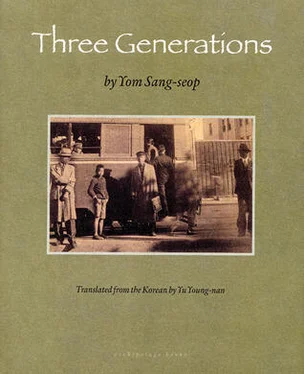“Samcheong-dong, I think. Number 110.”
Gyeong-ae leapt to her feet and said she had to go look for them. The desire for vengeance took possession of her.
“Don’t even think of it! You’re not going anywhere in that condition. Let’s wait a little longer because Jo Deok-gi said he’d go there, too.”
Ignoring the older woman, Gyeong-ae flew out the door and headed toward the streetcar terminus in search of a rickshaw. Pil-sun’s mother ran after her. Gyeong-ae carried herself briskly now, filled with purpose, not only to avenge the abuse she herself had suffered but also to defend Byeong-hwa.
Gyeong-ae was about to turn toward Jinmyeong Girls’ School when she halted, her eyes fixed on something in the distance. Pil-sun’s mother, startled, went out into the avenue and saw a group of dark shadows approaching in the hazy moonlight.
Pil-sun’s mother never imagined that anyone would try to make their way through Chuseongmun at night, but when she saw Gyeong-ae sprinting toward them, she, too, broke into a run.
Pil-sun’s mother couldn’t believe her eyes. Her husband was at the front of the group, supported by two others. Behind him was Byeong-hwa, to whom Gyeong-ae clung.
“What happened? My God, how can they do this to an innocent man?” Pil-sun’s mother whimpered, her voice breaking and her breath coming in short gasps.
“Stop talking. so loud. ” her husband said, panting. He was supported by his daughter and Won-sam.
“How could someone do this to my husband? And Byeong-hwa? How is he?”
A rickshaw driver was supporting him, but his gait seemed steady.
Deok-gi, still in his mourning overcoat, told Pil-sun’s mother to rush back to the store ahead of them to lay out the bedding. “Has the room been heated?”
Pil-sun’s mother scurried away.
“Did they take you to the Chinese restaurant first?” asked Gyeong-ae.
“What Chinese restaurant?” Byeong-hwa replied in a nasal voice, for a torn handkerchief had been stuffed in his nostrils to stanch the bleeding.
“Then you didn’t go to the Chinese restaurant. Those bastards!”
“What are you talking about?”
“Some bastard came to Bacchus and said you wanted to see me right away. I followed him, and there were three guys sitting there, bantering and eating and. ” Gyeong-ae choked up with emotion.
Deok-gi cut in. “Why did they act the way they did?”
“I hope they didn’t do anything to you.” Byeong-hwa spoke in a measured voice.
“They’re hoodlums.” Gyeong-ae’s voice was shrill.
“What did they do? Did they beat you, too?” He forgot about his own pain.
“I’ll tell you the details later. Where does it hurt? Do you feel a throbbing or a dull pain?”
“No, I’m all right, except my nose bled some.” Byeong-hwa seemed oddly indifferent.
“Why are you covered with mud? Where did you fight? How many people were there?”
“I think there were six drunks altogether — I’m sure I scared three of them out of their wits. They must have come from the Chinese restaurant.”
When they finally reached the storefront and caught a glimpse of each other in the light, they were shocked; they looked as if they had tumbled into a sea of mud. A thin crust of ice coated the mud. Their suits were ruined, and their hands and faces were quite a sight. Luckily, there wasn’t a single bruise on Pil-sun’s father, who had difficulty standing on his own, but blood was running in scarlet rivulets over Byeong-hwa’s muddied suit. His bloody mouth looked like that of a wild animal. Blood also streamed from a gaping wound on the back of his right hand; it looked like someone had bitten the flesh off. Afraid that onlookers might gather at the doorstep, they went into the store through a back alley. As they took off their clothes and cleaned themselves, Deok-gi tipped the rickshaw driver, who had accompanied them all the way from Suha-dong, and sent him on his way. The driver had left his gear at the stone steps on the Samcheong-dong side and now had to traipse through to Chuseongmun again to get it back.
Deok-gi had taken the rickshaw to Hwagae-dong in order to take Won-sam with him and had asked the driver to accompany them as backup, in anticipation of trouble.
Deok-gi ran to the telephone and called his family doctor to ask him to come over.
The gang had been seven in number; one had given orders to the other six. A pair of thugs had charged toward Byeong-hwa. Pil-sun’s father, who had left the store ahead of Byeong-hwa, was dragged away by a man who had been waiting in the alley. The two that grabbed Byeong-hwa had missed him when he’d rushed out of the store and jumped onto a streetcar on his way to the prison. They had waited half a day for another chance.
Of the group, Gyeong-ae had had the roughest time. A stranger had come to Bacchus, insisting that Byeong-hwa was in trouble and needed her. He accompanied her to Anguk-dong and led her into a filthy little Chinese restaurant at the foot of the Hwagae-dong hill, where another man was waiting for them.
“Where’s Byeong-hwa?” she demanded.
“Byeong-hwa? He’s in hell. If you want to see him, you’ll have to go look for him there yourself.”
Gyeong-ae was overcome with fear. Trying to get out of there by any means possible, she made a fuss, argued, and even tried to win them over by drinking what they forced on her. But when she made a break for the door, one of them barred the way. She hated their disparaging remarks about Byeong-hwa. Their demand that she hand over the money, however, sent a chill through her.
The very sound of the word money made her dizzy. Had all her secrets been revealed? Had Byeong-hwa also been kidnapped? Were these men police snitches? Gyeong-ae was relieved when they insisted that she hand over the secret funds from the police.
“How long have you been frequenting the Police Affairs Bureau? We hear they gave you five thousand won. You gave two thousand to Byeong-hwa to open the business, so you’ve still got three. Give it to us, and we’ll pretend we know nothing about it — we’ll forget about the whole thing and let you go home. No one would know, not even our boss.”
As they kept at her, threatening and coaxing, she laughed at them, careful not to show any fear.
“Let’s go find Kim Byeong-hwa,” Gyeong-ae said, as if willing to go along with their plan. “You can sort this out with him yourself.”
They wouldn’t hear of it, though. They continued to threaten her and started slapping her around. After two or three hours of abuse, they whispered to each other — most likely because they had run out of intimidation tactics — that they’d go fetch Byeong-hwa.
Then they began to quarrel: “You go!” “I’m not going.” At last, the man who had lured Gyeong-ae to the restaurant went out tentatively, claiming that he was not as drunk as his partner. After a while, he came back with an older man. As the target of the drunkards’ harassment, Gyeong-ae at first thought it was good that someone sober had been brought in, but then her heart lurched at the thought that perhaps this man was their boss.
When the older man, striding in, caught sight of the dishes and glasses strewn about on the table, he flew off the handle. “So you’re rolling in money, aren’t you? That’s why you’ve been drinking so much? Get out of here!”
Watching the underlings slink away, retreating as if to the nearest hole, Gyeong-ae felt she could trust this newcomer.
The man told Gyeong-ae to sit down and asked, “When did you get here?”
In spite Gyeong-ae’s revulsion, there was something about his low-key manner that she found reassuring.
“Are you the one who made them lie to get me here? Who the hell are you?”
Читать дальше












